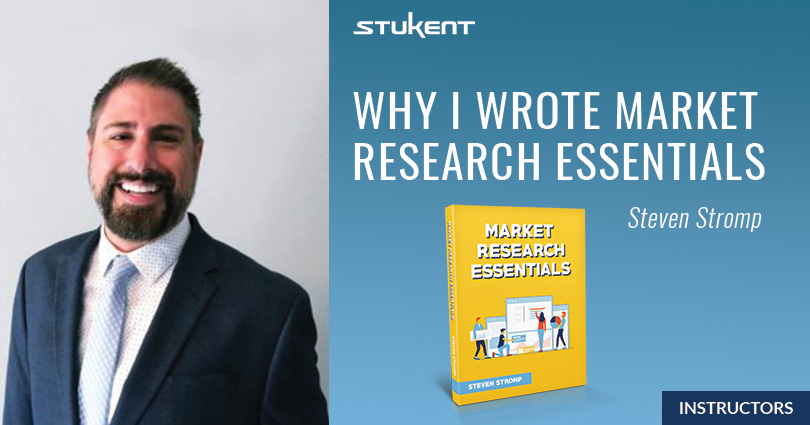For years I kept thinking to myself that I really needed to gather (in one place) all the tips and tricks, pitfalls, and major takeaways that I’ve been collecting since becoming a research practitioner, so when I was approached by Stukent to write “Market Research Essentials,” it was a dream come true for me; the courseware gave me the perfect opportunity to do just that!
In writing the content, it was important for me to share what I learned in my real-world experiences – but also combine that with what I have found works well in the market research courses I teach.
It is my philosophy that the curriculum focus on what graduates are likely to encounter in the workforce. Activities and assignments should be used to marry the concepts with what goes on professionally.
I am a researcher by trade, having developed studies and provided strategic information to organizations in a variety of industries, including healthcare and education.
Over the past several years, I have also been teaching research courses at the university level. Teaching was an exciting endeavor for me because it challenged me to look for ways to bridge what the real-world of research is like versus what is being taught in the classroom.
I would often struggle to reconcile what the research textbooks and curriculum covered versus what I knew practitioners need to be skilled in when developing a research study, collecting the data, and interpreting the results.
As educators, we all know students need to gain knowledge of a subject’s core concepts. But what can graduates expect when entering the workplace? What do they need to know “day one”?
For example, I hadn’t seen other texts that include the core components of what to ask in a typical new product development, brand perception, or satisfaction survey. The textbook’s inclusion of templates on these topics allows students to immediately become valuable players when designing, collecting, and using opinion data. Similarly, students should know how to design and evaluate a research proposal – a skill most employers will find valuable. So, such content is found in the book.
Now, more than ever, I see a need for a more practical guide to market research. Yes, large consulting firms and large corporations still employ dedicated research professionals. Yet a shift is occurring.
In industries such as sales, human resources, and marketing (among others), the research functions are going to those who are already jacks of all trades. For instance, a marketer today needs to have traditional marketing skills along with social media savviness, PR skills, digital advertising expertise – and research knowledge.
Even if a position isn’t directly responsible for conducting research, it is crucial that professionals understand how to work with research vendors, evaluate the merits of various study designs, and be able to interpret data in order to develop strong strategic recommendations.
Through a combination of core concepts and real-world examples and projects, students will be best suited to enter a landscape where solid research skills are being sought after by all industries regardless of the role one plays.
If you are like me and are always looking for ways to improve your market research course, please take a moment to review my book by clicking the button below and requesting access on the next page. If this teaching approach can be of as much help to your students as it has been to mine, that is the greatest reward I could receive!
About the Author – Steven Stromp holds over 20 years of experience in the market research field. He has conducted research for a variety of industries, including healthcare, consumer packaged goods, automotive and higher education.
Stromp is currently the Executive Director of Market Intelligence at Davenport University. In his role, he provides market insights about the higher education landscape to help drive strategic decision making. His insights are used to develop new instructional programs as well as review current programming. He also teaches courses in marketing foundations, businesses research, and marketing research.








